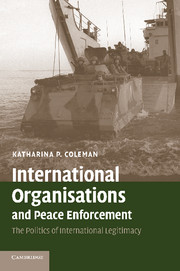Book contents
- Frontmatter
- Contents
- List of maps
- List of figures
- List of tables
- Acknowledgements
- List of abbreviations
- 1 Introduction
- 2 States, international organisations, and legitimacy: a theoretical framework
- 3 Peace enforcement through sub-regional organisations: the Economic Community of West African States and Operation Liberty in Liberia
- 4 Peace enforcement through sub-regional organisations: the Southern African Development Community and Operation Sovereign Legitimacy in the Democratic Republic of Congo
- 5 Peace enforcement through sub-regional organisations: the Southern African Development Community and Operation Boleas in Lesotho
- 6 Peace enforcement through a military alliance: the North Atlantic Treaty Organisation and Operation Allied Force in Kosovo
- 7 Peace enforcement through a global organisation: the United Nations and INTERFET in East Timor
- 8 Conclusion
- Epilogue: UN intervention in Lebanon
- Appendix: Summary of interviews conducted
- Bibliography
- Index
8 - Conclusion
Published online by Cambridge University Press: 10 November 2010
- Frontmatter
- Contents
- List of maps
- List of figures
- List of tables
- Acknowledgements
- List of abbreviations
- 1 Introduction
- 2 States, international organisations, and legitimacy: a theoretical framework
- 3 Peace enforcement through sub-regional organisations: the Economic Community of West African States and Operation Liberty in Liberia
- 4 Peace enforcement through sub-regional organisations: the Southern African Development Community and Operation Sovereign Legitimacy in the Democratic Republic of Congo
- 5 Peace enforcement through sub-regional organisations: the Southern African Development Community and Operation Boleas in Lesotho
- 6 Peace enforcement through a military alliance: the North Atlantic Treaty Organisation and Operation Allied Force in Kosovo
- 7 Peace enforcement through a global organisation: the United Nations and INTERFET in East Timor
- 8 Conclusion
- Epilogue: UN intervention in Lebanon
- Appendix: Summary of interviews conducted
- Bibliography
- Index
Summary
This book has argued that in the contemporary international system states launch peace enforcement operations within the framework of international organisations primarily because they wish to ensure the international legitimacy of these operations. This concluding chapter summarises and juxtaposes the findings of the five case studies in this project, noting differences but above all stressing the remarkable similarities among them. Overall, the empirical findings in this book support the legitimacy-centred theory of the role of international organisations against its main alternatives. This chapter then takes a step back from the focus on peace enforcement operations that has pervaded this project to situate these findings in the broader universe of international military activity. It also considers the one conspicuous exception to the trend studied here: the 2003 US-led invasion of Iraq, which portrayed itself as akin to a peace enforcement mission but did not occur under the auspices of an international organisation. It argues that this case illustrates not only the limits but also the strength of a legitimacy-based conception of the role of international organisations. Finally, the chapter reflects on the theoretical and practical implications of recognising international organisations as gatekeepers to legitimacy in the contemporary international system.
Summary of empirical evidence
This book has analysed five peace enforcement operations launched on three continents: Europe (Kosovo), Asia (East Timor), and Africa (Liberia, Democratic Republic of Congo, and Lesotho).
- Type
- Chapter
- Information
- International Organisations and Peace EnforcementThe Politics of International Legitimacy, pp. 278 - 313Publisher: Cambridge University PressPrint publication year: 2007

